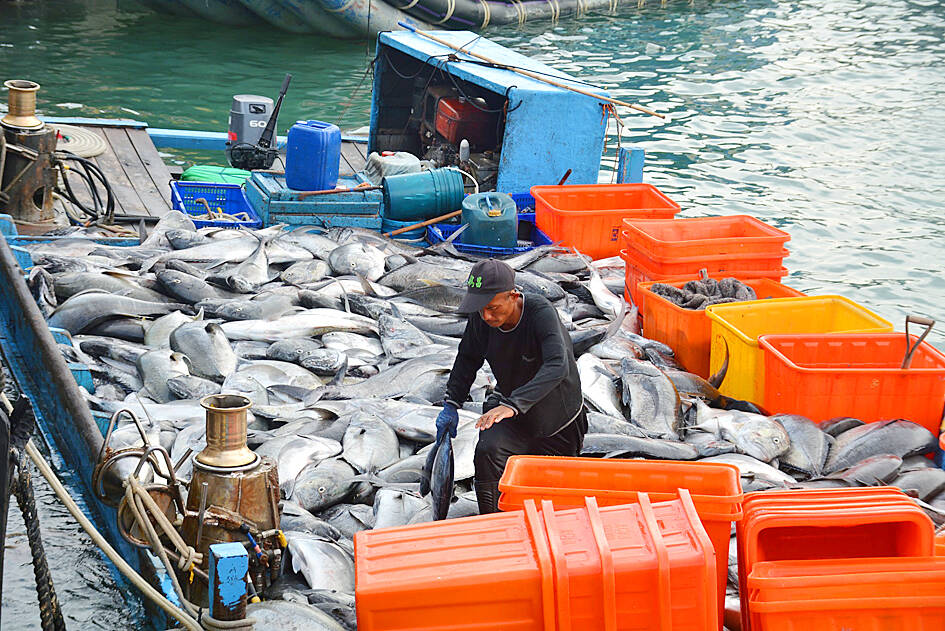Two years after the government approved an Action Plan for Fisheries and Human Rights, efforts to ensure the basic rights of migrant fishers are still inadequate, civic groups told a news conference on Wednesday, urging the authorities to address problems in the distant-water fishing sector.
The Cabinet on May 20, 2022, approved a three-year plan to improve the rights of fishing crew, onboard facilities and onshore facilities.
An alliance of civic groups concerned with the basic rights of migrant fishers presented a mid-term review of the plan, saying that Taiwan has done badly in fulfilling labor standards, improving living conditions and social security, and improving management and monitoring of shipowners.

Photo courtesy of Lin Yu-kai via CNA
Taiwan received a rating of one out of three stars in each category.
Greenpeace ocean campaigner Yuton Lee (李于彤) cited the lack of Internet access on most Taiwanese fishing vessels, which has rendered channels set up by the Fisheries Agency for migrant distant-water fishers to file complaints over potential infringements of their rights obsolete.
So far, only 98 out of more than 1,000 Taiwanese distant-water fishing vessels, or less than 10 percent, have had Wi-Fi installed, Lee added.
The Fisheries Agency recently drafted guidelines regarding Wi-Fi use on distant-water fishing vessels, which recommended allowing crew members “at least 40MB or three hours of data use each month,” said Taiwan Association for Human Rights senior researcher Shih Yi-hsiang (施逸翔), which he called “grossly insufficient.”
Lennon Wong (汪英達), director of migrant worker policies at the Serve the People Association in Taoyuan, said the agency had drawn up “terrible” guidelines by working with representatives from the seafood industry while ignoring suggestions proposed by civic groups.
Other issues that contributed to the scathing scores included delayed salary payments, excessive working hours and failure to incorporate the C188 Work in Fishing Convention (C188) adopted by the International Labour Organization (ILO) into domestic law, the groups said.
The groups also cited “pre-planned” interviews of migrant distant-water fishers and poor interpretation quality that compromises the ability to assess migrant fishers’ working conditions.
The US and the EU are major markets for Taiwan’s distant-water fishing sector, and both place great emphasis on human rights, Lee said.
Taiwan’s distant-water fishing industry is therefore in pressing need of reform if it is to retain its global competitiveness, she said.
With the inauguration of President William Lai (賴清德), the new administration should identify ways to improve or enforce the action plan, she added.
The Fisheries Agency said in a statement that the guidelines on migrant fishers’ Wi-Fi use have not been finalized and that a final version would be published at a later date.
Interviews conducted by the agency follow a standard procedure and use standardized survey questions to ascertain whether migrant fishers have been subjected to mistreatment, it said.
The agency uses a questionnaire titled “assessment of possible exploitation of foreign crew members” created by the Ministry of the Interior to determine whether there is forced labor on Taiwanese-flagged fishing vessels, it added.
A draft bill to adopt the ILO-C188 is expected to be delivered to the Cabinet for review this year before it is deliberated by the legislature, it added.

Taipei and New Taipei City government officials are aiming to have the first phase of the Wanhua-Jungho-Shulin Mass Rapid Transit (MRT) line completed and opened by 2027, following the arrival of the first train set yesterday. The 22km-long Light Green Line would connect four densely populated districts in Taipei and New Taipei City: Wanhua (萬華), Jhonghe (中和), Tucheng (土城) and Shulin (樹林). The first phase of the project would connect Wanhua and Jhonghe districts, with Chiang Kai-shek Memorial Hall and Chukuang (莒光) being the terminal stations. The two municipalities jointly hosted a ceremony for the first train to be used

MILITARY AID: Taiwan has received a first batch of US long-range tactical missiles ahead of schedule, with a second shipment expected to be delivered by 2026 The US’ early delivery of long-range tactical ballistic missiles to Taiwan last month carries political and strategic significance, a military source said yesterday. According to the Ministry of National Defense’s budget report, the batch of military hardware from the US, including 11 sets of M142 High Mobility Artillery Rocket Systems (HIMARS) and 64 MGM-140 Army Tactical Missile Systems, had been scheduled to be delivered to Taiwan between the end of this year and the beginning of next year. However, the first batch arrived last month, earlier than scheduled, with the second batch —18 sets of HIMARS, 20 MGM-140 missiles and 864 M30

Representative to the US Alexander Yui delivered a letter from the government to US president-elect Donald Trump during a meeting with a former Trump administration official, CNN reported yesterday. Yui on Thursday met with former US national security adviser Robert O’Brien over a private lunch in Salt Lake City, Utah, with US Representative Chris Stewart, the Web site of the US cable news channel reported, citing three sources familiar with the matter. “During that lunch the letter was passed along, and then shared with Trump, two of the sources said,” CNN said. O’Brien declined to comment on the lunch, as did the Taipei

A woman who allegedly attacked a high-school student with a utility knife, injuring his face, on a Taipei metro train late on Friday has been transferred to prosecutors, police said yesterday. The incident occurred near MRT Xinpu Station at about 10:17pm on a Bannan Line train headed toward Dingpu, New Taipei City police said. Before police arrived at the station to arrest the suspect, a woman surnamed Wang (王) who is in her early 40s, she had already been subdued by four male passengers, one of whom was an off-duty Taipei police officer, police said. The student, 17, who sustained a cut about